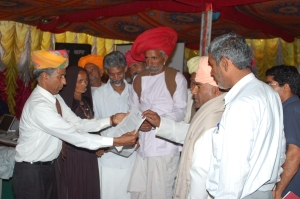
Indian pastoralist leaders hand over petition about Livestock Keepers’ Rights to Dr. Sadana of the National Bureau of Animal Genetic Resources
There is no shortage of global initiatives in the livestock sector. There is of course the Global Agenda of Action towards sustainable livestock sector development – we wrote about it previously. But there is also the Global Alliance for a safer, fairer and more sustainable livestock sector that apparently was launched during a meeting at ILRI in March. Notable is the overlap in the big organisations that are involved: FAO, ILRI, and Worldbank. Others in the Global Alliance are IFAD, OIE (World Organisation of Animal Health), the African Union’s Interafrican Bureau for Animal Resources, and the Bill and Melinda Gates Foundation. One wonders about the reasons behind these coalitions. And we also wonder why livestock keepers are not (yet) officially recognised or mentioned as a stakeholder group in these processes which include governments, research institutions, private sector and NGOs, but no representatives of the 600-800 million poor livetsock keepers in the world. The LIFE Network is of course working and advocating to change this and presented a statement to this effect in the 23rd meeting of the Commission on Agriculture, a body that is composed of government representatives, and that was asked to gives its backing to the GAA and its secretariat being hosted by FAO for the time being. The statement was also on behalf of CELEP, the Coalition of European Lobbies for East African Pastoralism. We are sure that this was taken note of and will continue to pursue the issue. In the next few weeks this blog will provide some more background information about “small-scale livestock keepers” and why they are so important to listen to. Watch out for the next post!
